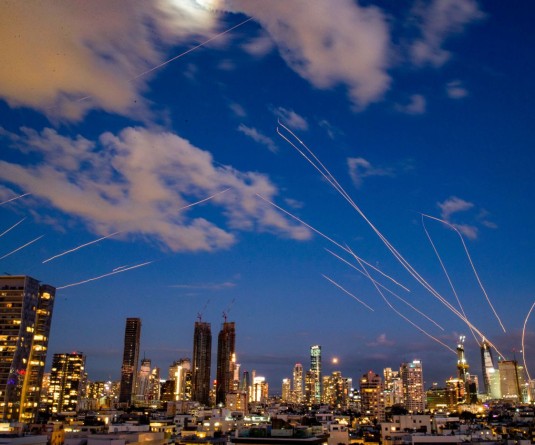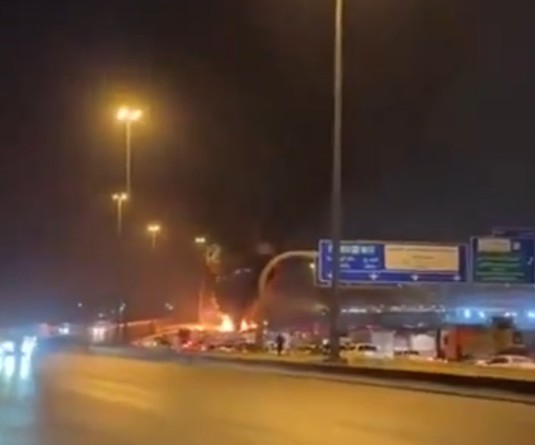A combination of satellite images shows the area, which was heavily damaged by a massive explosion and a blast wave, on August 5, 2020 and the same area on November 4, 2019 in Beirut, Lebanon. Russian space agency Roscosmos/Handout via REUTERS
BEIRUT, August 5 (Reuters): Lebanese rescue workers searched for survivors in the mangled wreckage of buildings and investigators blamed negligence for a massive warehouse explosion that sent a devastating blast wave across Beirut, killing at least 135 people.
More than 4,000 people were injured in Tuesday's explosion at Beirut port and up to 250,000 were left without homes fit to live in after shockwaves smashed building facades, sucked furniture out into streets and shattered windows miles inland.
The death toll was expected to rise from the blast that officials blamed on a huge stockpile of highly explosive material stored for years in unsafe conditions at the port.
The explosion was the most powerful ever to rip through Beirut, a city still scarred by civil war that ended three decades ago and reeling from an economic meltdown and a surge in coronavirus infections. The blast rattled buildings on the Mediterranean island of Cyprus, about 100 miles (160 km) away.
President Michel Aoun said 2,750 tonnes of ammonium nitrate, used in fertilisers and bombs, had been stored for six years at the port without safety measures, after it was seized.
He said in a national address the government was "determined to investigate and expose what happened as soon as possible, to hold the responsible and the negligent accountable."
An official source familiar with preliminary investigations blamed the incident on "inaction and negligence", saying "nothing was done" by committees and judges involved in the matter to order the removal of hazardous material.
The cabinet ordered port officials involved in storing or guarding the material since 2014 to be put under house arrest, ministerial sources told Reuters. The cabinet also announced a two-week state of emergency in Beirut.
'COLLAPSE OF LEBANON'
Ordinary Lebanese, who have lost jobs and watched savings evaporate in Lebanon's financial crisis, blamed politicians who have overseen decades of state corruption and bad governance.
"This explosion seals the collapse of Lebanon. I really blame the ruling class," said Hassan Zaiter, 32, a manager at the heavily damaged Le Gray Hotel in downtown Beirut.
The health minister said the death toll had climbed to 135, as the search for victims continued after shockwaves from the blast hurled some of the victims into the sea.
Relatives gathered at the cordon to Beirut port seeking information on those still missing. Many of those killed were port and custom employees, people working in the area or those driving nearby during the Tuesday evening rush hour.
The Red Cross was coordinating with the Health Ministry to set up morgues as hospitals were overwhelmed.
Beirut's Clemenceau Medical Center was "like a slaughterhouse, blood covering the corridors and the lifts," said Sara, one of its nurses.
Beirut Governor Marwan Abboud told broadcaster LBC the blast had caused damage worth up to $5 billion, and possibly more, and left up to 250,000 people without homes.
Offers of international support poured in. Gulf Arab states, who in the past were major financial supporters of Lebanon but recently stepped back because of what they say is Iranian meddling, sent planes with medical equipment and other supplies. Iran offered food and a field hospital, ISNA news agency said.
The United States, Britain, France and other Western nations, which have been demanding political and economic change in Lebanon, also offered help. Germany, the Netherlands and Cyprus offered specialised search and rescue teams.
'CATASTROPHE'
For many it was a dreadful reminder of the 1975 to 1990 civil war that tore the nation apart and destroyed swathes of Beirut, much of which had been rebuilt.
"This is a catastrophe for Beirut and Lebanon." Beirut's mayor, Jamal Itani, told Reuters while inspecting damage.
Officials did not say what caused the initial blaze at the port that set off the blast. A security source and media said it was started by welding work being carried out on a warehouse.






